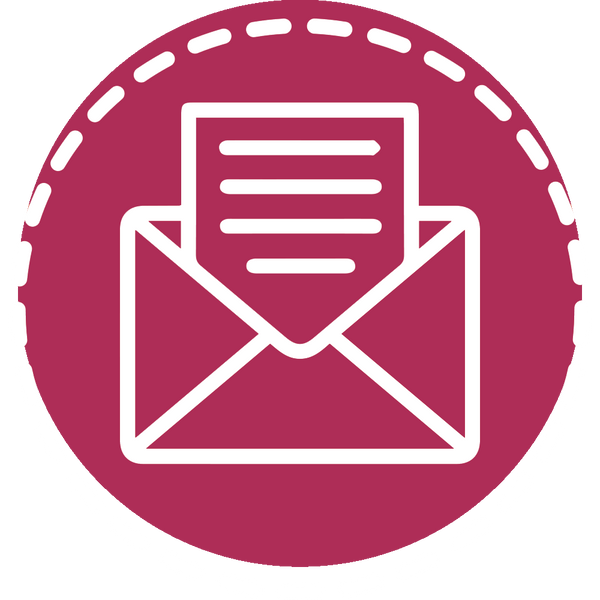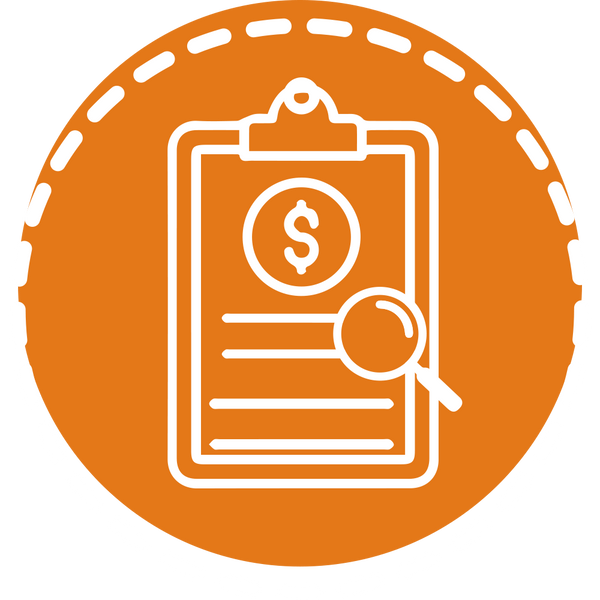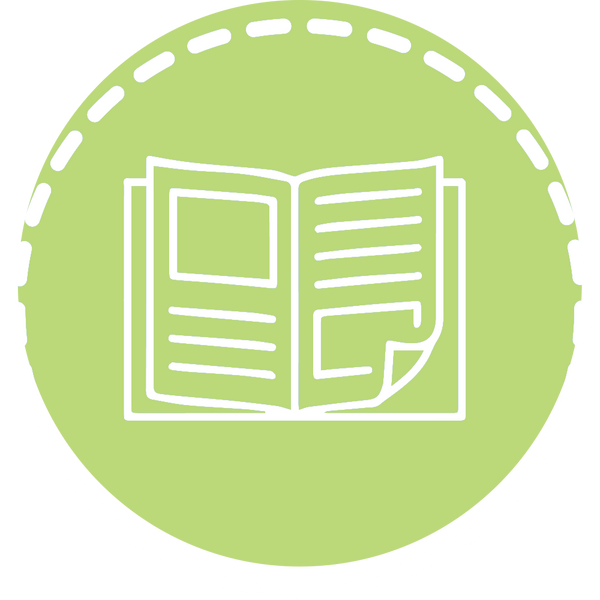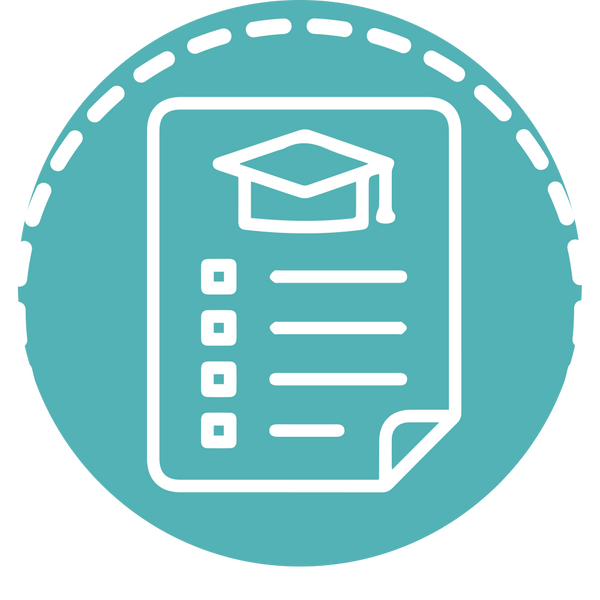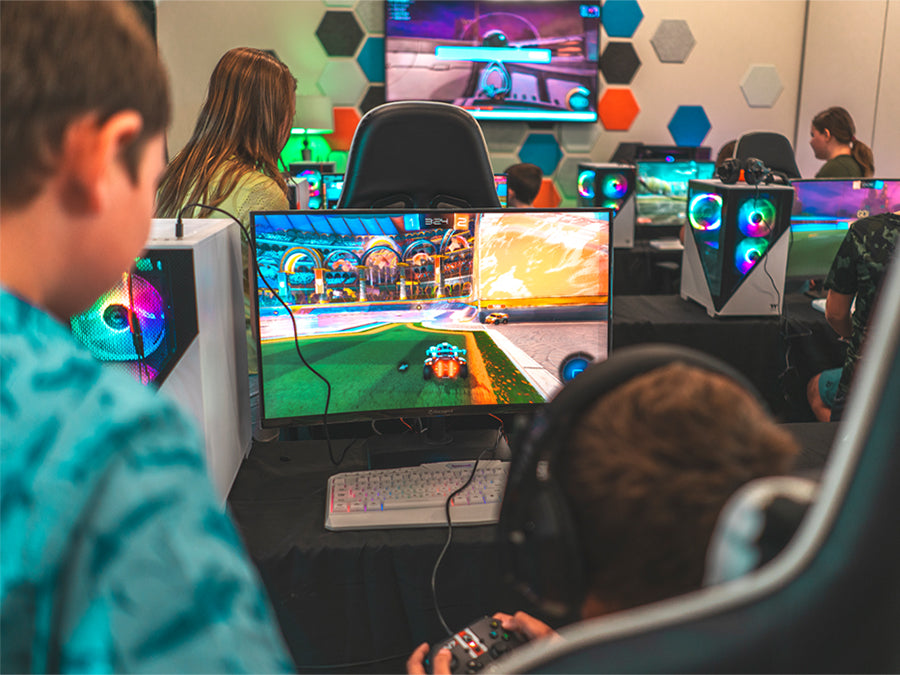
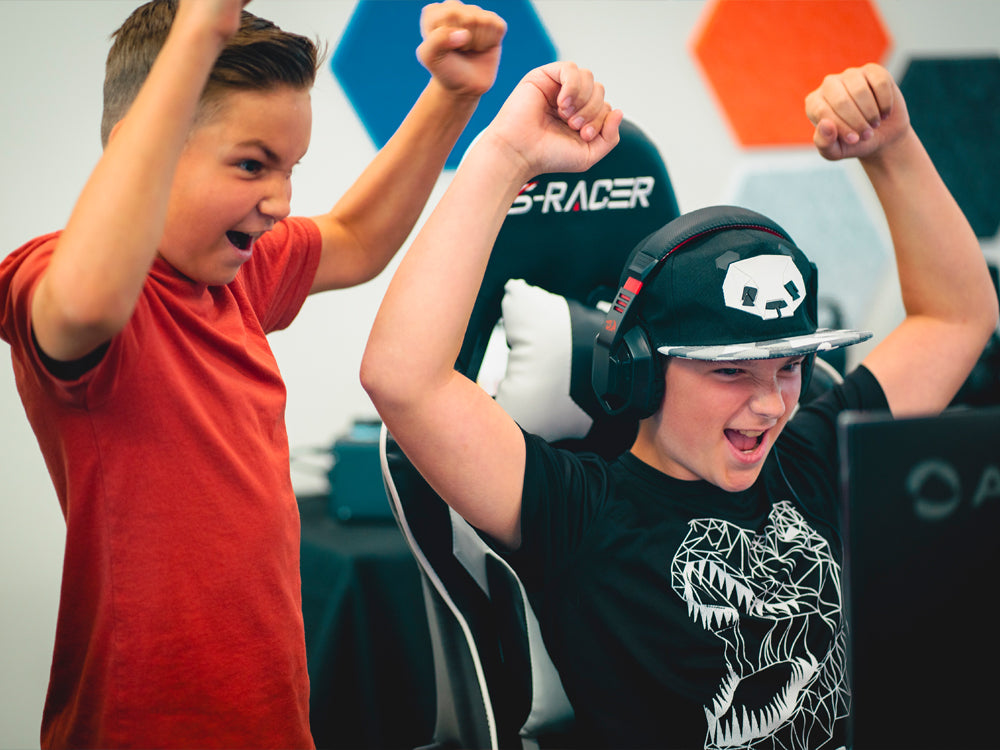
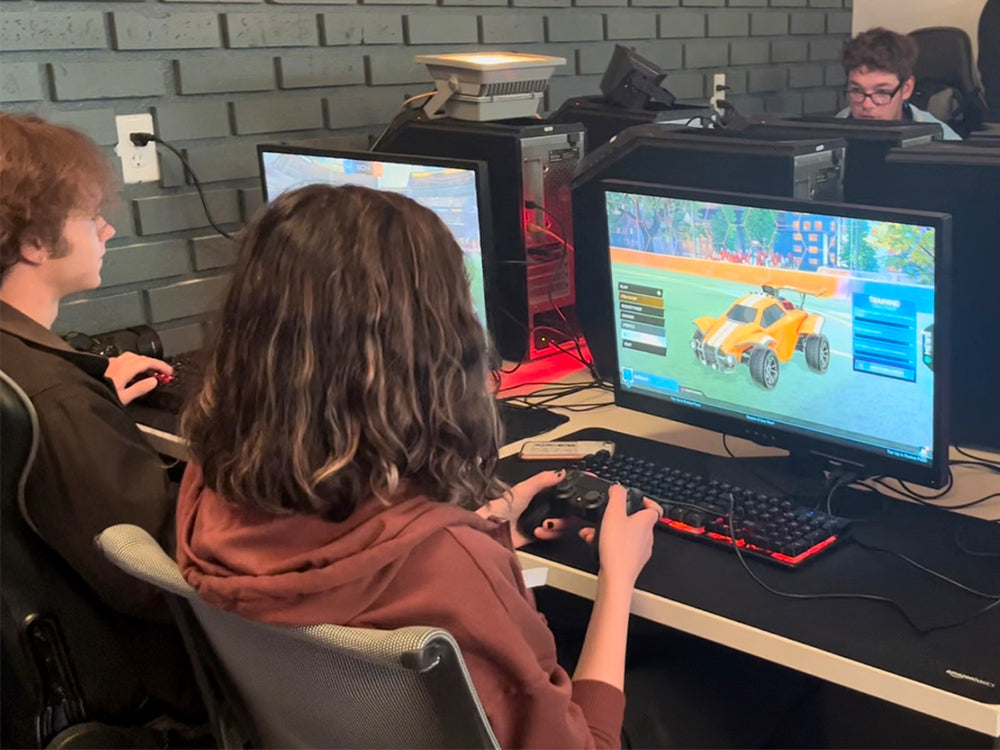
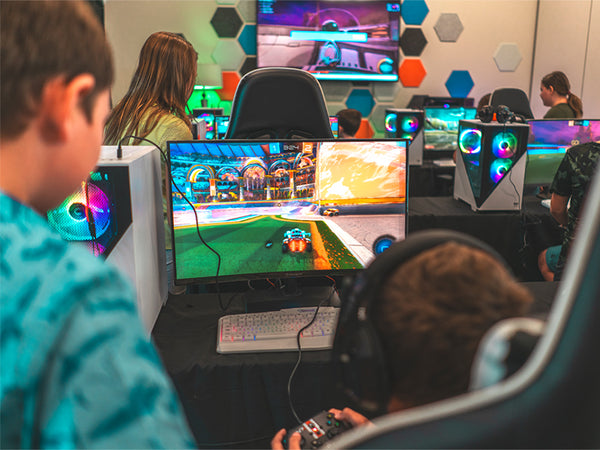
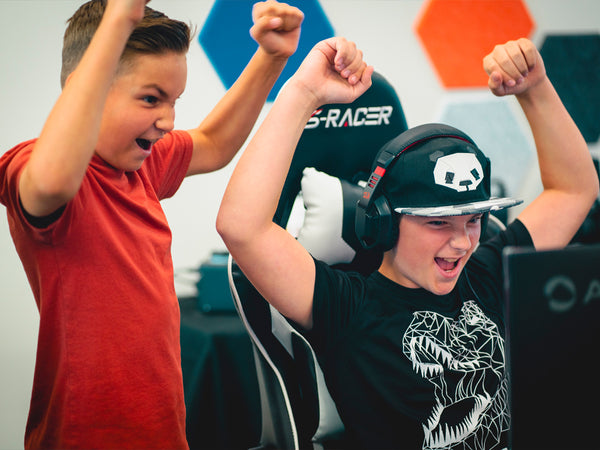
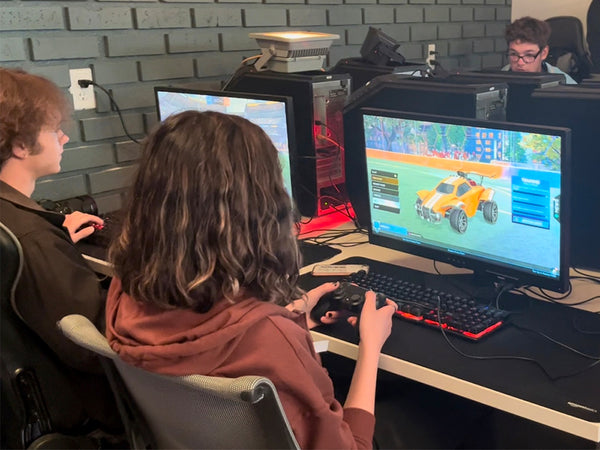



ESPORTS (with Virtual Instructors)
- Price
- 4,695 USD
Unlock Student Potential with Expert-led Esports Programs
Expert remote coaches deliver Esports programs to your students. This turnkey program is best suited for grades 6-12, and includes STEM Forged’s highly-rated curriculum and online portal for students, teachers and administrators.
The STEM Forged Esports Complete Program provides schools a turnkey offering to launch or expand their esports initiatives. Coaches foster critical skills such as teamwork, problem-solving and digital literacy while providing students with in-game skill training.
Coaches ensure consistent, high-quality instruction by bridging any expertise gaps, even across many sites and teams. This program simplifies implementation and integration, ensuring minimal impact on current staff’s existing workload.
All STEM Forged programs come with an online portal that gives educators and administrators a view of students’ progress, including unique insights into esports skill development. This portal tracks student progression, giving administrators meaningful data about student and program performance.
For customized solutions, consult a STEM Program Specialist.
Grades: 6-12
Students: Up to 25
Contact Hours: 68+
Subject Targets:
Technology, Social Studies
Reusability and Expansion:
- Annual Subscription: Renew to keep expanding on game design knowledge and topics.
Settings & Tech Requirements
Recommended Settings:
- Classrooms
- Out-of-School Time Programs
- CTE
- Home Learning
Tech Requirements:
One Windows computer per student with at least:
- Operating System: Windows 7 or newer
- Processor: Minimum 2.5 GHz Dual-Core
- Storage: Minimum 4GB
- Direct X: DirectX 11
- Graphics: Minimum NVIDIA GeForce 760, AMD Radeon R7 270X, or better
High-speed internet connection
Curriculum Topics
Each Activity Includes:
- Remote, dedicated instructor to teach curriculum
- Vocabulary
- ISTE Standard concepts
- Real-world application concepts
Curriculum Topics:
- Mindset Management
- Mindset in the Professional World
- Self-awareness
- Self-Management
- Responsible Decision-Making
- Emotional Resilience
- Using Failure
- Understanding Recovery
- Team Expectations
- Teamwork
- Digital Citizenship
- Social Awareness
- Understanding Roles
- Relationship Skills
- Compassionate Leadership
- Developing a Growth Mindset
- Goal Setting
- Goal-Directed Behavior
- Practicing Efficiently
- Training Mind and Body
- Improving Gamesense
- Applying Knowledge
- History of Esports
- Careers in Esports
- Careers and Skill Marketing
Professional Development
Product Orientation:
- Guided-setup and 1-hour orientation included
Materials
Each Program Includes:
- Remote Instructor
- Curriculum
League and Competition setup, pro player guest coaches, and school ESPORTS swag are also available. Reach out to a STEM Program Specialist for details.
Standards & Alignment
Habits of Mind:
16 thinking habits developed by Art Costa and Bena Kallick to empower students to succeed in a 21st-century learning environment.
- Persisting
- Managing Impulsivity
- Listening with Understanding and Empathy
- Thinking Flexibly
- Thinking about Thinking (Metacognition)
- Striving for Accuracy
- Questioning and Posing Problems
- Applying Past Knowledge to New Situations
- Thinking and Communicating with Clarity and Precision
- Gathering Data through All Senses
- Creating, Imagining, Innovating
- Responding with Wonderment and Awe
- Taking Responsible Risks
- Finding Humor
- Thinking Interdependently
- Remaining Open to Continuous Learning
21st Century Skills:
A set of widely-applicable abilities essential for success in the information age.
- Health Literacy
- Creativity and Innovation
- Critical Thinking and Problem Solving
- Communication
- Collaboration
- Information Literacy
- Media Literacy
- ICT (Information, Communications, and Technology) Literacy
- Flexibility and Adaptability
- Initiative and Self-Direction
- Social and Cross-Cultural Skills
- Productivity and Accountability
- Leadership and Responsibility
© 2018 Partnership for 21st Century Learning (P21), p21.org. All Rights Reserved. P21 was not involved in the production of this product and does not endorse it.
Common Core State Standards for English Language Arts:
- CCSS.ELA-LITERACY.SL.6.1: Engage effectively in a range of collaborative discussions (one-on-one, in groups, and teacher-led) with diverse partners on grade 6 topics, texts, and issues, building on others' ideas and expressing their own clearly.
- Up to CCSS.ELA-LITERACY.SL.11-12.1: Initiate and participate effectively in a range of collaborative discussions (one-on-one, in groups, and teacher-led) with diverse partners on grades 11-12 topics, texts, and issues, building on others' ideas and expressing their own clearly and persuasively.
- CCSS.ELA-LITERACY.SL.6.2: Interpret information presented in diverse media and formats (e.g., visually, quantitatively, orally) and explain how it contributes to a topic, text, or issue under study.
- Up to CCSS.ELA-LITERACY.SL.11-12.2: Integrate multiple sources of information presented in diverse formats and media (e.g., visually, quantitatively, orally) in order to make informed decisions and solve problems, evaluating the credibility and accuracy of each source and noting any discrepancies among the data.
- CCSS.ELA-LITERACY.SL.6-12.4: Present claims and findings, sequencing ideas logically and using pertinent descriptions, facts, and details to accentuate main ideas or themes; use appropriate eye contact, adequate volume, and clear pronunciation.
- Up to CCSS.ELA-LITERACY.SL.11-12.4: Present information, findings, and supporting evidence, conveying a clear and distinct perspective, such that listeners can follow the line of reasoning, alternative or opposing perspectives are addressed, and the organization, development, substance, and style are appropriate to purpose, audience, and a range of formal and informal tasks.
© Copyright 2010. National Governors Association Center for Best Practices and Council of Chief State School Officers. All rights reserved.
International Society for Technology in Education:
- 1.1.a: Students articulate and set personal learning goals, develop strategies leveraging technology to achieve them and reflect on the learning process itself to improve learning outcomes.
- 1.1.b: Students build networks and customize their learning environments in ways that support the learning process.
- 1.2.a: Students cultivate and manage their digital identity and reputation and are aware of the permanence of their actions in the digital world.
- 1.2.b: Students engage in positive, safe, legal and ethical behavior when using technology, including social interactions online or when using networked devices.
- 1.3.a: Students plan and employ effective research strategies to locate information and other resources for their intellectual or creative pursuits.
- 1.3.d: Students build knowledge by actively exploring real-world issues and problems, developing ideas and theories and pursuing answers and solutions.
- 1.4.a: Students know and use a deliberate design process for generating ideas, testing theories, creating innovative artifacts or solving authentic problems.
- 1.4.d: Students exhibit a tolerance for ambiguity, perseverance and the capacity to work with open-ended problems.
- 1.5.b: Students collect data or identify relevant data sets, use digital tools to analyze them, and represent data in various ways to facilitate problem-solving and decision-making.
- 1.5.c: Students break problems into component parts, extract key information, and develop descriptive models to understand complex systems or facilitate problem-solving.
- 1.6.c: Students communicate complex ideas clearly and effectively by creating or using a variety of digital objects such as visualizations, models or simulations.
- 1.6.d: Students publish or present content that customizes the message and medium for their intended audiences.
ISTE Standards for Students, ©2016, ISTE® (International Society for Technology in Education), iste.org. All rights reserved. ISTE was not involved in the production of this product and does not endorse it.
About the Author
STEM Forged
STEM Forged is passionate about bridging the gap in education through the exciting world of esports, game design, and gamified learning.
Their mission is to empower schools that may be lacking in resources and expertise by delivering comprehensive programs that engage and inspire students.
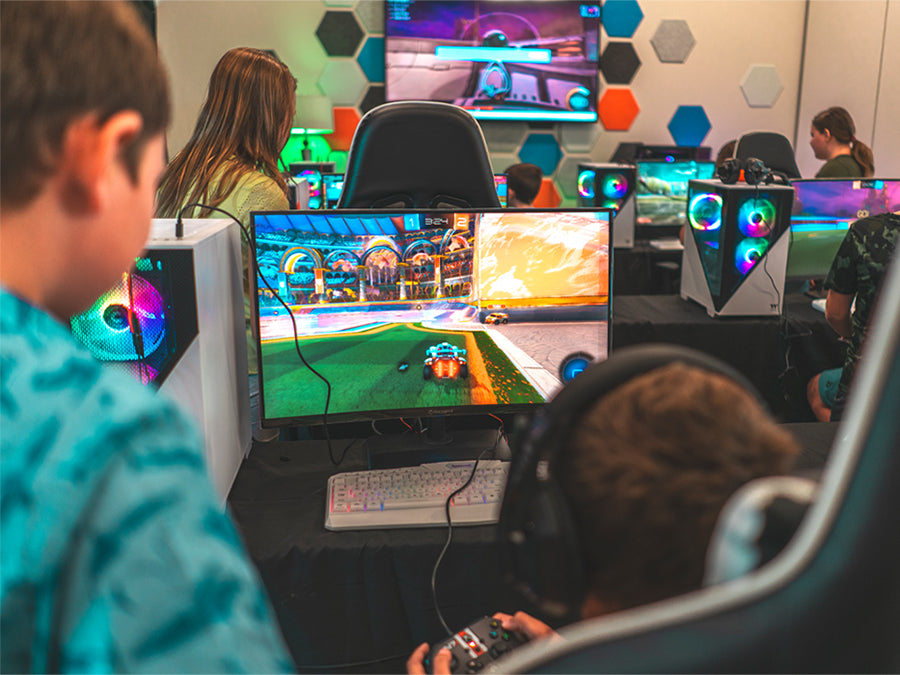
ESPORTS (with Virtual Instructors)
Pricing Options:
- 30 Hours: 4,695.00 USD
- 60 Hours: 6,995.00 USD
- 170 Hours: 18,495.00 USD
Recommended Settings:
- Classrooms
- Out-of-School Time Programs
- CTE
- Home Learning
Tech Requirements:
One Windows computer per student with at least:
- Operating System: Windows 7 or newer
- Processor: Minimum 2.5 GHz Dual-Core
- Storage: Minimum 4GB
- Direct X: DirectX 11
- Graphics: Minimum NVIDIA GeForce 760, AMD Radeon R7 270X, or better
High-speed internet connection
Each Activity Includes:
- Remote, dedicated instructor to teach curriculum
- Vocabulary
- ISTE Standard concepts
- Real-world application concepts
Curriculum Topics:
- Mindset Management
- Mindset in the Professional World
- Self-awareness
- Self-Management
- Responsible Decision-Making
- Emotional Resilience
- Using Failure
- Understanding Recovery
- Team Expectations
- Teamwork
- Digital Citizenship
- Social Awareness
- Understanding Roles
- Relationship Skills
- Compassionate Leadership
- Developing a Growth Mindset
- Goal Setting
- Goal-Directed Behavior
- Practicing Efficiently
- Training Mind and Body
- Improving Gamesense
- Applying Knowledge
- History of Esports
- Careers in Esports
- Careers and Skill Marketing
Product Orientation:
- Guided-setup and 1-hour orientation included
Each Program Includes:
- Remote Instructor
- Curriculum
League and Competition setup, pro player guest coaches, and school ESPORTS swag are also available. Reach out to a STEM Program Specialist for details.
Habits of Mind:
16 thinking habits developed by Art Costa and Bena Kallick to empower students to succeed in a 21st-century learning environment.
- Persisting
- Managing Impulsivity
- Listening with Understanding and Empathy
- Thinking Flexibly
- Thinking about Thinking (Metacognition)
- Striving for Accuracy
- Questioning and Posing Problems
- Applying Past Knowledge to New Situations
- Thinking and Communicating with Clarity and Precision
- Gathering Data through All Senses
- Creating, Imagining, Innovating
- Responding with Wonderment and Awe
- Taking Responsible Risks
- Finding Humor
- Thinking Interdependently
- Remaining Open to Continuous Learning
21st Century Skills:
A set of widely-applicable abilities essential for success in the information age.
- Health Literacy
- Creativity and Innovation
- Critical Thinking and Problem Solving
- Communication
- Collaboration
- Information Literacy
- Media Literacy
- ICT (Information, Communications, and Technology) Literacy
- Flexibility and Adaptability
- Initiative and Self-Direction
- Social and Cross-Cultural Skills
- Productivity and Accountability
- Leadership and Responsibility
© 2018 Partnership for 21st Century Learning (P21), p21.org. All Rights Reserved. P21 was not involved in the production of this product and does not endorse it.
Common Core State Standards for English Language Arts:
- CCSS.ELA-LITERACY.SL.6.1: Engage effectively in a range of collaborative discussions (one-on-one, in groups, and teacher-led) with diverse partners on grade 6 topics, texts, and issues, building on others' ideas and expressing their own clearly.
- Up to CCSS.ELA-LITERACY.SL.11-12.1: Initiate and participate effectively in a range of collaborative discussions (one-on-one, in groups, and teacher-led) with diverse partners on grades 11-12 topics, texts, and issues, building on others' ideas and expressing their own clearly and persuasively.
- CCSS.ELA-LITERACY.SL.6.2: Interpret information presented in diverse media and formats (e.g., visually, quantitatively, orally) and explain how it contributes to a topic, text, or issue under study.
- Up to CCSS.ELA-LITERACY.SL.11-12.2: Integrate multiple sources of information presented in diverse formats and media (e.g., visually, quantitatively, orally) in order to make informed decisions and solve problems, evaluating the credibility and accuracy of each source and noting any discrepancies among the data.
- CCSS.ELA-LITERACY.SL.6-12.4: Present claims and findings, sequencing ideas logically and using pertinent descriptions, facts, and details to accentuate main ideas or themes; use appropriate eye contact, adequate volume, and clear pronunciation.
- Up to CCSS.ELA-LITERACY.SL.11-12.4: Present information, findings, and supporting evidence, conveying a clear and distinct perspective, such that listeners can follow the line of reasoning, alternative or opposing perspectives are addressed, and the organization, development, substance, and style are appropriate to purpose, audience, and a range of formal and informal tasks.
© Copyright 2010. National Governors Association Center for Best Practices and Council of Chief State School Officers. All rights reserved.
International Society for Technology in Education:
- 1.1.a: Students articulate and set personal learning goals, develop strategies leveraging technology to achieve them and reflect on the learning process itself to improve learning outcomes.
- 1.1.b: Students build networks and customize their learning environments in ways that support the learning process.
- 1.2.a: Students cultivate and manage their digital identity and reputation and are aware of the permanence of their actions in the digital world.
- 1.2.b: Students engage in positive, safe, legal and ethical behavior when using technology, including social interactions online or when using networked devices.
- 1.3.a: Students plan and employ effective research strategies to locate information and other resources for their intellectual or creative pursuits.
- 1.3.d: Students build knowledge by actively exploring real-world issues and problems, developing ideas and theories and pursuing answers and solutions.
- 1.4.a: Students know and use a deliberate design process for generating ideas, testing theories, creating innovative artifacts or solving authentic problems.
- 1.4.d: Students exhibit a tolerance for ambiguity, perseverance and the capacity to work with open-ended problems.
- 1.5.b: Students collect data or identify relevant data sets, use digital tools to analyze them, and represent data in various ways to facilitate problem-solving and decision-making.
- 1.5.c: Students break problems into component parts, extract key information, and develop descriptive models to understand complex systems or facilitate problem-solving.
- 1.6.c: Students communicate complex ideas clearly and effectively by creating or using a variety of digital objects such as visualizations, models or simulations.
- 1.6.d: Students publish or present content that customizes the message and medium for their intended audiences.
ISTE Standards for Students, ©2016, ISTE® (International Society for Technology in Education), iste.org. All rights reserved. ISTE was not involved in the production of this product and does not endorse it.
STEM Forged
STEM Forged is passionate about bridging the gap in education through the exciting world of esports, game design, and gamified learning.
Their mission is to empower schools that may be lacking in resources and expertise by delivering comprehensive programs that engage and inspire students.




